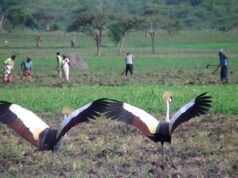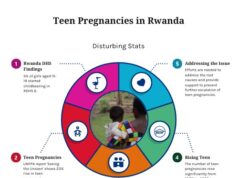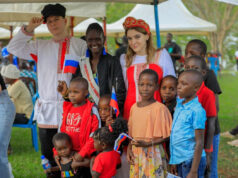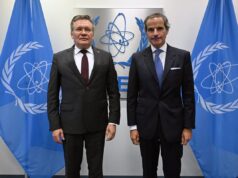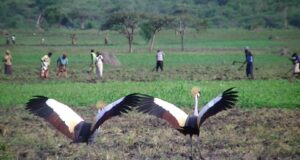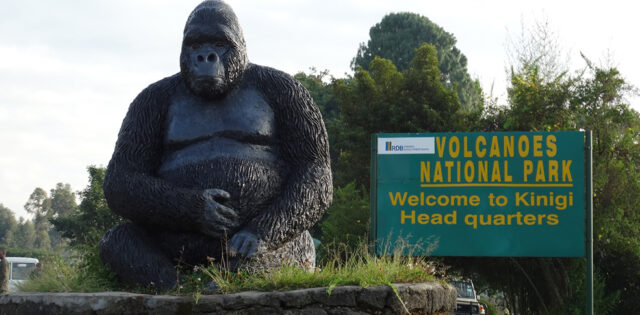
By Charles Ndushabandi.
Janvier Kwizera, the in charge of community relations at Volcanoes National Park says the expansion of
the park will not only benefit the mountain gorillas but also improve the lives of the communities living
around the park and make visiting the gorillas an even more life-changing experience.
“The Volcanoes National Park is a fragile ecosystem and currently relatively small as it covers 160 square
kilometers, that is why, it is set to be expanded by a quarter of its current size,” Kwizera says.
Kwizera says the park which is currently 160km squared, was previously 340sqkm “This is a very small
space which sees gorilla families fighting for territory with some young ones are killed,”
The 10-year program to expand the park will begin with a pilot study in Kinigi sector and is expected to
be expanded by about 23%. The project which is in partnership with the African Wildlife Foundation will
cost more than 260billion francs over 10 years.
Speaking at the 18th Kwita Izina ceremony on 2nd September where 20 baby gorillas were named Prime
Minister Edouard Ngirente said the Volcanoes National Park will be expanded to accommodate the
growing number of gorillas and improve their resilience to threats, including climate change.
“Given the threats we face from biodiversity loss, climate change, and pollution, we are called on to
expand our network of national parks and create new protected areas that restore our rural and urban
wetlands,” Ngirente said.
He said that the park’s expansion will also benefit communities through new economic opportunities,
increased tourism, and job creation.
“By investing in the communities that surround our national parks, we are building a strong
constituency for conservation that will span generations,”
“Given the threats we face from biodiversity loss, climate change, and pollution, we are called on to
expand our network of national parks and create new protected areas that restore our rural and urban
wetlands,” Dr. Ngirente said.
The proposed expansion has been received with mixed reactions with some section of Rwandans
skeptical about it.
Mbarushimana Tito, an Irish potato farmer around the park said the expansion would take away their
livelihood and displace them from their ancestral land.
“Our families have lived in this place for generations cultivating here mostly sorghum and Irish potatoes
displacing would mean over 1000 families would return to poverty which we have fought very hard to
come out of,” Mbarushimana said.
Kayitare Edgar, an economic expert, says the expansion will likely have a huge impact on the country’s
food security since the areas where the expansion is taking place have been the food basket of the
country.
“For the last several months the country has been struggling with food shortages that led to food
inflation for example Irish potatoes which is the staple food for Rwandans, and is largely produced
around the park at Rwf 1500 from 300. Has the government found alternative areas where this food will
be grown?” Kayitare asks.
He adds that “though the government move is good for conservation and probably the tourism brings in
much more revenue decision makers out to think the impact of the expansion on food security as it
would far-reaching consequences on the country.”
Speaking before the plenary sitting of the lower chamber of Parliament the Rwanda Development Board
(RDB) CEO, Francis Gatare, said the expansion will not only benefit the species but also improve the lives
of the communities living around the park and make visiting the gorillas an even more life-changing
experience.
“The residents have the right to carry out activities on their land, such as farming. But he pointed out it
would be recklessness if we allow that they set up long-term buildings while it is known that they will be
expropriated in the near future,” Gatera told parliament.
The park expansion will result in the acquisition of 450 ha, a green village to host relocated 560
households, and ensure livelihood improvement that will see 22 ha allocated to smart agriculture
production and other income-generating activities for the community.
These will be complemented by the support of different off-farm business plans developed by the
community.
A smart green village will be constructed and will have different components including land productivity
whereby 1000 square meters per household will be used for agriculture production.
To manage space, it disclosed that houses in such villages will be constructed in a 4 in 1 design. This
means that one house will accommodate four families.
Other components are infrastructure development consisting of a nursery school, health center, Mini-
market or selling point, village internal roads, supply of electricity and clean water, and financial service
infrastructures.
Gorilla trekking which is the main driver of high-end tourism in Rwanda, generated revenues of $113
million, which is a quarter of the $445 million in tourism revenues that Rwanda generated in 2022,
according to data from RDB’s 2022 annual report.

